Uzbekistan, Azerbaijan, and Türkiye sign declaration on combating sovereignty threats and enhancing transport links
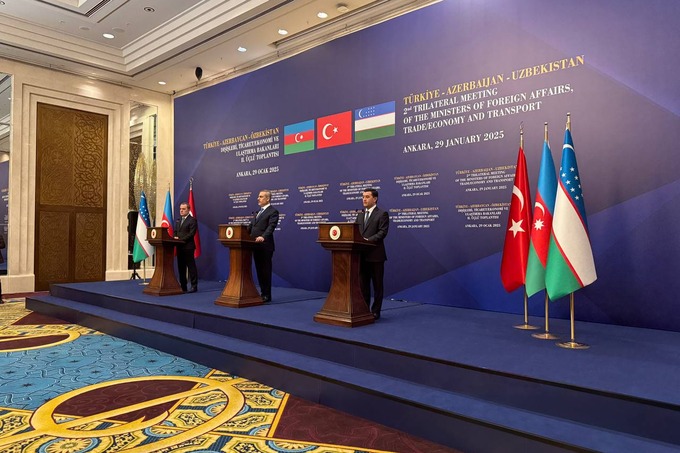
Photo: MFA
On January 29, the second trilateral meeting of the Foreign Affairs, Economy, Trade, and Transport Ministers of Uzbekistan, Azerbaijan, and Türkiye took place in Ankara, where the countries emphasized their commitment to jointly combat threats to each other's sovereignty, simplify trade, and assist Uzbekistan in transporting cargo via the Middle Corridor, as reported by the Ministry of Transport's press service.
The meeting was attended by Uzbekistan's ministers Bakhtiyor Saidov, Laziz Kudratov, and Ilhom Mahkamov.
Discussions centered on foreign policy and regional cooperation, strengthening trade, economic, and investment relations, and developing transport networks.
At the end of the meeting, the Ankara Declaration, the final document of the gathering, was adopted and signed.
What is the Ankara Declaration about?
The declaration affirms the countries' firm commitment to support each other’s sovereignty, territorial integrity, and the inviolability of borders, as reported by Türkiye’s Anadolu news agency.
The document acknowledges the growing importance of joint projects in areas such as trade, investment, industry, energy, transport, logistics, digitalization, and communications.
The significance of the Middle Corridor, which spans the borders of all three countries, is highlighted, emphasizing its role in enhancing the transit potential of Türkiye Azerbaijan, and Uzbekistan.
Europe-Caucasus-Asia transport corridor
The declaration also addresses strengthening the "Europe-Caucasus-Asia" transport corridor, enhancing its operational efficiency, and ensuring the full effectiveness of its mechanisms.
It stresses that the existing trilateral cooperation framework between the three countries is designed to reinforce shared goals and mutual benefits.
Joint efforts against sovereignty threats
The declaration underscores the countries' strong commitment to expanding cooperation on issues that reflect common regional and international interests.
It also expresses support for collective action against any attempts to undermine the sovereignty and territorial integrity of the states.
Supporting projects to enhance connectivity
The declaration expresses firm commitment to continuing joint efforts to unlock the full potential of cooperation in sectors like economy, trade, investments, and transit transportation.
Boosting the capacity of the Middle Corridor
The statement highlights the need to improve transport infrastructure to align with other regional transport initiatives, assist in digitalization, and facilitate trade flows along the Middle Corridor.
It emphasizes the importance of new infrastructure projects, particularly in areas such as transport, border crossings, and customs procedures, to enhance the Middle Corridor’s capacity and competitiveness.
Projects like the Baku International Sea Trade Port and the Baku-Tbilisi-Kars railway are fully supported.
The declaration also stresses the expansion of cooperation between logistics centers, carriers, and stations. The Logistics Centers and Freight Forwarders Association, established in June 2024, is tasked with developing transport infrastructure, attracting investments through cooperation with state and private entities, and finding solutions for fast, regular, and cost-effective transportation.
A mechanism for meetings of transport association heads of the Organization of Turkic States (OTS) was established in March 2024 to develop the transport potential of OTS member states and the private transport sector.
The declaration also notes the adoption of an action plan to improve cooperation in transport, strengthen regional connections, and build sustainable transport systems.
The parties welcomed the ongoing efforts to implement the eCMR system for digitizing transport documents among OTS member states at the UN Economic Commission for Europe.
The trial implementation of an electronic permit system between Türkiye and Azerbaijan, as well as between Türkiye and Uzbekistan, was also praised.
The parties affirmed their readiness to assist in the facilitation of Uzbek goods transportation through the Middle Corridor.
Cooperation in regional transport, communications, and infrastructure development, including the planning, construction, and operation of railway and highway projects, logistics centers, and airports, was also agreed upon.
Investments in Karabakh and Eastern Zangezur
The parties confirmed the importance of contributing to Azerbaijan's reconstruction and rehabilitation efforts in the Karabakh and Eastern Zangezur regions, which include infrastructure, social services, and smart city solutions, as well as demining. They expressed interest in investment projects in these areas.
Agreements within the OTS framework
The parties expressed satisfaction with the signing of agreements within the OTS framework, including the creation of a simplified customs corridor, a strategic document on trade facilitation, and a partnership agreement on the digital economy.
The participants expressed confidence that the full operation of the Turkey Investment Fund, established by the OTS in 2024, will significantly stimulate trade, infrastructure, and development projects in sectors such as industrial production, transport, agriculture, digital technologies, and tourism.
Developing economic, trade, and investment relations
The declaration stresses the need to strengthen cooperation in construction, procurement, and related matters. It also highlights the importance of trade, industrial, and economic relations.
Additionally, the declaration emphasizes the commitment to fostering mutual investments between the private sectors, expanding direct contact between entrepreneurs, chambers of commerce, business associations, and exploring new opportunities for imports and exports.
The declaration underscores the importance of enhancing connections between supply chain participants and business representatives, improving inter-agency coordination in a broader cooperation framework, and facilitating foreign trade operations.
It also highlights the importance of expediting trade measures in line with the OTS's strategic document on trade facilitation and the approval of the 2025 action plan by the OTS's Trade Facilitation Committee.
Collaboration in industry, agriculture, innovations, and digitalization
The declaration underscores the importance of strengthening technical cooperation in food security, agriculture, the food industry, and related research and development areas. It also stresses the need to create sustainable and vital value chains in agriculture.
The parties also emphasized expanding cooperation in the field of regional energy security, with particular focus on renewable energy sources.
Importance of the Trans-Afghan railway project
The parties agreed that Afghanistan’s stable peace and socio-economic development are critical to ensuring security in Central Asia.
The declaration highlights the importance of the Trans-Afghan Railway Project, which will strengthen regional transport and economic ties, increase trade flows, and create new opportunities for economic relations between regions.
Call for a two-state solution to the Israel-Palestine conflict
The statement welcomed the announcement of a ceasefire in Gaza, urging all parties to adhere to it and ensure unhindered humanitarian assistance for Palestinians. It also calls for a fair and sustainable resolution to the Israel-Palestine conflict, based on a two-state solution, which includes the establishment of an independent, sovereign, and geographically integrated Palestinian state within the 1967 borders, with East Jerusalem as its capital.
Recommended
List of streets and intersections being repaired in Tashkent published
SOCIETY | 19:12 / 16.05.2024
Uzbekistan's flag flies high on Oceania's tallest volcano
SOCIETY | 17:54 / 15.05.2024
New tariffs to be introduced in Tashkent public transport
SOCIETY | 14:55 / 05.05.2023
Onix and Tracker cars withdrawn from sale
BUSINESS | 10:20 / 05.05.2023
Related News
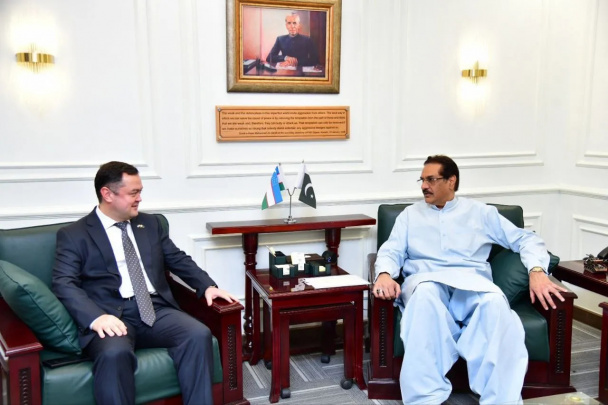
13:28 / 05.07.2025
Uzbekistan and Pakistan discuss new defense industry projects
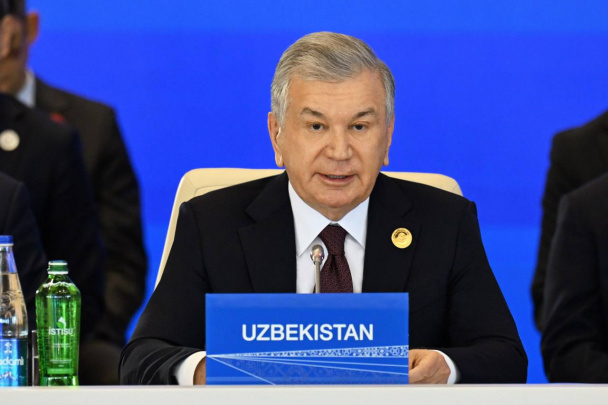
17:31 / 04.07.2025
Shavkat Mirziyoyev calls for end to violence in Gaza, urges recognition of Palestinian state
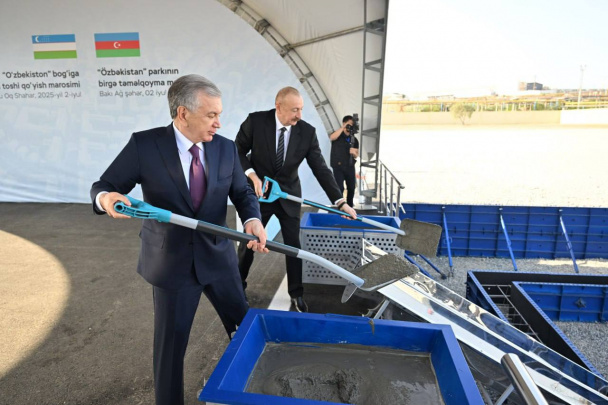
12:09 / 03.07.2025
Uzbekistan-themed cultural park to be established in Baku
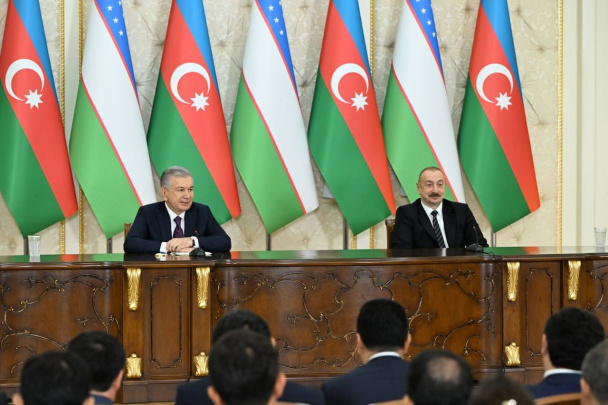
21:36 / 02.07.2025



